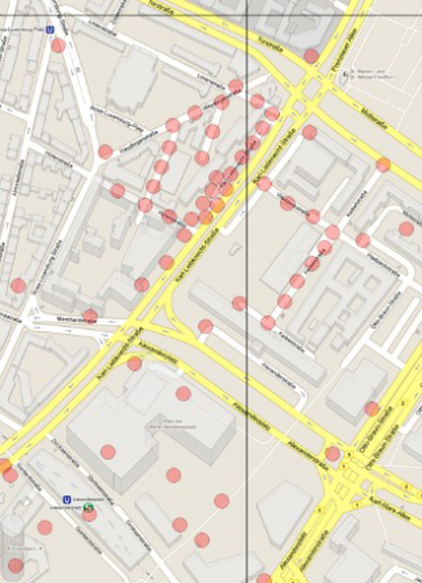_Rimini Protokoll (DEU), 50 kilometres of files
#Original Stasi recordings #Acoustic surveillance map #Self-guided #Mitte
30.08-01.09.13 12:00-19:00, B_Tour Info Center - Karl-Liebknecht-Str. 34, 10174
duration depending on audience members, in German only
Audience will collect a smart phone and a map at the starting point (an ID or passport deposit is required)
Radioortung: 50 kilometres of files is a Deutschlandradio Kultur and Rimini Apparat production in co-production with Hebbel am Ufer, Berlin.
With consultancy support from the Office of the Federal Commissioner for Preserving the Records of the State Security Service of the Former German Democratic Republic (BStU) and the Robert-Havemann-Gesellschaft e.V.
With generous support from Sony Ericsson.
Radioortung: 50 kilometres of files – a walk-in Stasi radio play
Rimini Protokoll haul the Stasi files out of the archives and into the city’s present: about a hundred people in Berlin’s Mitte district are surveyed and asked to recollect or reconstruct for the microphone observations of the sites where the misdeeds were perpetrated. A strange picture-puzzle is created for the users, who have the everyday life familiar to us now in view juxtaposed with original audio recordings from that time in their ears.
Using GPS phones, the visitors on foot become "insiders", entering into history. This dive into the Cold War era of mistrust becomes palpable with the bureaucratic procedures of applying for files and filling out forms and reading what people in your immediate environment set down about your life, all of which is superimposed onto today’s Berlin. How do the surveillance reports sound at the site of their recording for those who were then under surveillance, and how fast does the initially uninvolved observer become an active player? On a website, 100 "acoustic bubbles" are shown scattered across a map of Berlin’s Mitte district. Listeners and walkers experience the city as an audible and highly-subjective archive. Online visitors can also move through this acoustic surveillance map. Moving alone or in groups, visitors on foot and online have to come to grips with the role of the surveillance authority in a search for the audio portals to the city below the city.
Using GPS phones, the visitors on foot become "insiders", entering into history. This dive into the Cold War era of mistrust becomes palpable with the bureaucratic procedures of applying for files and filling out forms and reading what people in your immediate environment set down about your life, all of which is superimposed onto today’s Berlin. How do the surveillance reports sound at the site of their recording for those who were then under surveillance, and how fast does the initially uninvolved observer become an active player? On a website, 100 "acoustic bubbles" are shown scattered across a map of Berlin’s Mitte district. Listeners and walkers experience the city as an audible and highly-subjective archive. Online visitors can also move through this acoustic surveillance map. Moving alone or in groups, visitors on foot and online have to come to grips with the role of the surveillance authority in a search for the audio portals to the city below the city.
Helgard Haug, Stefan Kaegi & Daniel Wetzel
Helgard Haug, Stefan Kaegi and Daniel Wetzel studied at the Institut für Angewandte Theaterwissenschaft in Giessen and work together (in various combinations) under the name of Rimini Protokoll. They are recognized as being among the leaders and creators of the theatre movement known as "Reality Trend" (Theater der Zeit), which has exerted a powerful influence on the alternative theatre scene. Each project begins with a concrete situation in a specific place and is then developed through an intense exploratory process. They have attracted international attention with their dramatic works, which take place in that colourful zone between reality and fiction. Since 2000, Rimini Protokoll has brought its "theatre of experts" to the stage and into city spaces, interpreted by non-professional actors who are called "experts" for that very reason. Since 2004 Helgard Haug, Stefan Kaegi und Daniel Wetzel are based at Hebbel am Ufer (HAU) Berlin.

